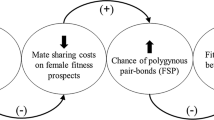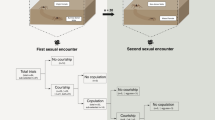Abstract
FOLLOWING a copulation, males in many species of vertebrates (particularly birds)1–4 and invertebrates5,6 remain near the inseminated female and repel other suitors with displays or force. Guarding males must delay resumption of competitive mate searching7, but they may insure their paternity by reducing possibilities for secondary matings and sperm competition8,9. Among mammals, post-copulatory mate guarding has been reported in rodents10–12, mongooses13, ungulates14,15 and primates16,17, including humans18, but the effects of such behaviour on male reproductive success have not been determined genetically. I report here that mate guarding by male Idaho ground squirrels (Spermophilus brunneus) enhances a male's probability of paternity. Furthermore, an analysis based on game theory shows that mate guarding is an evolutionarily stable strategy for male S. brunneus, but not male Belding's ground squirrels (S. beldingi), which resume searching once copulation is completed.
This is a preview of subscription content, access via your institution
Access options
Subscribe to this journal
Receive 51 print issues and online access
$199.00 per year
only $3.90 per issue
Buy this article
- Purchase on Springer Link
- Instant access to full article PDF
Prices may be subject to local taxes which are calculated during checkout
Similar content being viewed by others
References
Birkhead, T. R., Johnson, S. D. & Nettleship, D. N. Anim. Behav. 33, 608–619 (1985).
Møller, A. P. Behav. Ecol. Sociobiol. 17, 401–408 (1985).
Robinson, S. K. Anim. Behav. 34, 241–255 (1986).
McKinney, F. in Ecological Aspects of Social Evolution (eds Rubenstein, D. I. & Wrangham, R. W.) 153–171 (Princeton Univ. Press, Princeton, 1986).
Waage, J. K. in Sperm Competition and the Evolution of Animal Mating Systems (ed. Smith, R. L.) 251–290 (Academic, Orlando, 1984).
Thornhill, R. & Alcock, J. The Evolution of Insect Mating Systems (Harvard Univ. Press, Cambridge, 1983).
Schwagmeyer, P. L. & Parker, G. A. Anim. Behav. 35, 1015–1025 (1987).
Parker, G. A. in Sperm Competition and the Evolution of Animal Mating Systems (ed. Smith, R. L.) 1–60 (Academic, Orlando, 1984).
Birkhead, T. R., Pellat, J. & Hunter, F. M. Nature 334, 60–62 (1988).
Farentinos, R. C. Anim. Behav. 20, 316–326 (1972).
Barash, D. P. Behav. Ecol. Sociobiol. 9, 187–193 (1981).
Dobson, F. S. J. Mammal. 64, 218–225 (1983).
Rood, J. P. Anim. Behav. 28, 143–150 (1980).
Lott, D. F. Z. Tierpsychol. 56, 97–114 (1981).
Hogg, J. T. Ethology 75, 119–144 (1987).
Tutin, C. E. G. Behav. Ecol. Sociobiol. 6, 29–38 (1979).
Bercovitch, F. B. Behav. Ecol. Sociobiol. 21, 163–172 (1987).
Flinn, M. V. Ethol. Sociobiol. 9, 1–28 (1988).
Yensen, E. Unpubl. Rep. Idaho Dept. Fish & Game, 1–41 (1985).
Hoogland, J. L. & Foltz, D. W. Behav. Ecol. Sociobiol. 11, 155–163 (1982).
Voss, R. Occ. Pap. Mus. Zool. Univ. Mich. 689, 1–27 (1979).
Selander, R. K., Smith, M. H., Yang, S. H., Johnson, W. E. & Gentry, J. B. Stud Genetics, Univ. Texas Publ. 7103, 49–90 (1971).
May, B. P., Wright, J. E. & Stoneking, M. J. Fish Res. Board Canada 36, 1114–1126 (1979).
Dewsbury, D. A. in Sperm Competition and the Evolution of Animal Mating Systems (ed. Smith, R. L.) 547–571 (Academic, Orlando, 1984).
Ginsberg, J. R. & Huck, U. W. Trends Ecol. Evol. 4, 74–79 (1989).
Foltz, D. W. & Hoogland, J. L. J. Mammal. 62, 706–712 (1981).
Loughry, W. J. Behaviour 103, 27–48 (1987).
Schwartz, O. A. & Armitage, K. B. Science 207, 665–667 (1980).
Armitage, K. B. in Ecological Aspects of Social Evolution (eds Rubenstein, D. I. & Wrangham, R. W.) 303–331 (Princeton Univ. Press, Princeton, 1986).
Sherman, P. W. thesis, Univ. Michigan (1976).
Sherman, P. W. & Morton, M. L. Ecology 65, 1617–1628 (1984).
Sherman, P. W. in Sociobiology: Beyond Nature /Nurture? (eds Barlow, G. W. & Silverberg, J.) 505–544 (Westview, Boulder, 1980).
Hanken, J. & Sherman, P. W. Science 212, 351–353 (1981).
Maynard Smith, J. Evolution and the Theory of Games (Cambridge Univ. Press, Cambridge, 1982).
Foltz, D. W. & Schwagmeyer, P. L. Am. Nat. 133, 257–265 (1989).
MacArthur, R. H. & Pianka, E. R. Am. Nat. 100, 603–609 (1966).
Author information
Authors and Affiliations
Rights and permissions
About this article
Cite this article
Sherman, P. Mate guarding as paternity insurance in Idaho ground squirrels. Nature 338, 418–420 (1989). https://doi.org/10.1038/338418a0
Received:
Accepted:
Issue Date:
DOI: https://doi.org/10.1038/338418a0
This article is cited by
-
Daily foraging activity of an imperiled ground squirrel: effects of hibernation, thermal environment, body condition, and conspecific density
Behavioral Ecology and Sociobiology (2022)
-
Meiotic drive changes sperm precedence patterns in house mice: potential for male alternative mating tactics?
BMC Evolutionary Biology (2016)
-
Individual, social, and sexual niche traits affect copulation success in a polygynandrous mating system
Behavioral Ecology and Sociobiology (2016)
-
Male reproductive tactics to increase paternity in the polygynandrous Columbian ground squirrel (Urocitellus columbianus)
Behavioral Ecology and Sociobiology (2011)
-
Sociality, Bateman’s gradients, and the polygynandrous genetic mating system of round-tailed ground squirrels (Xerospermophilus tereticaudus)
Behavioral Ecology and Sociobiology (2011)
Comments
By submitting a comment you agree to abide by our Terms and Community Guidelines. If you find something abusive or that does not comply with our terms or guidelines please flag it as inappropriate.



